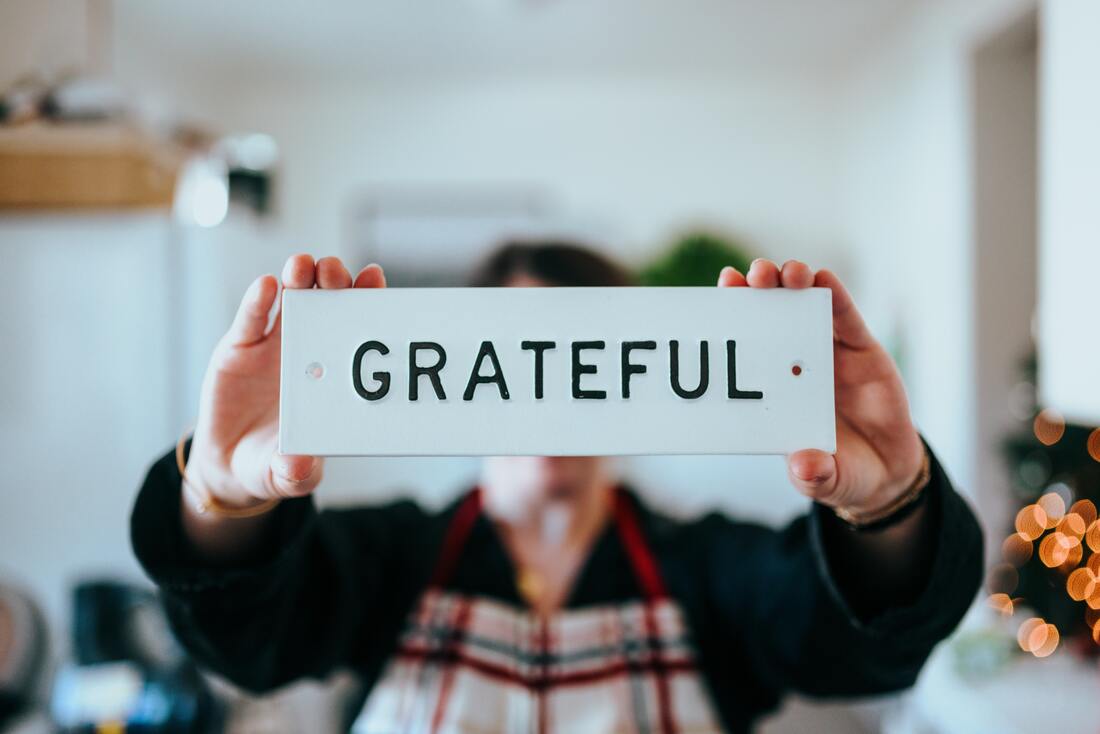 Photo by Nathan Dumlao on Unsplash Two people in my life are facing a terminal illness. And here’s what else they have in common: gratitude. Every time I talk to them, whether a simple conversation or in spiritual direction, I am amazed at the depth of their gratefulness. Their faces light up. It is like their diagnoses gave them new eyes to see life. And they are overwhelmed by the beauty right in front of them. Even more so, they are overwhelmed by the peace of God inside of them. The windows of their souls reflect it in such delightful ways. “Every day I wake up so happy!” one exclaimed to me (without a single relationship or situation changing in their life). How is this possible? Much of it is pure gift. Grace. And some of it, I am sure, is because both have done inner work in the years leading up to this moment. They learned how to listen deeply to God and how to listen deeply to others. They entered into meditation and mindfulness. They learned to play and be playful. They sought out spiritual direction and a precious few others to accompany them along their inner journey. Now their outer journey reflects what they cultivated within. Awe. Humor. Peace. Kindness. Joy. (Just to name a few) I am honored to be a witness. They are teaching me a lot. One of their gifts is reflected in the Sufi poet, Rumi's words, “I saw grief drinking a cup of sorrow and said to it, ‘Tastes sweet does it not?’ Grief confessed, ‘You’ve caught me and ruined my business. How can I sell sorrow when you know it’s a blessing?’” If you have no idea how sorrow can be a blessing and if you do not wake up happy, maybe it is time for an inner journey of your own. There is so much to be grateful for in this life.  Photo by Damian Siodłak on Unsplash Photo by Damian Siodłak on Unsplash Choices can be difficult. Wanting to make the perfect one, I can struggle with “buyer’s remorse.” It can be about a purchase or any decision I have made or need to make (especially if others are concerned). Did I take enough time to make the best choice? What if I didn’t? Was I right? Was I wrong? I will replay the options. Especially if my choice does not please others, I will replay it even more. Sometimes it can become compulsive, stuck on a loop in my brain. We all have experienced the stress that comes from obsessive over-thinking. Over the years, I have tried a variety of ways to “throw a stick in the spokes” and stop the constant thought-cycle. The practice of Centering Prayer has been one thing that, gradually, has made a difference. Centering Prayer can be a challenge as one gets to discover all the places the unruly mind wants to wander instead of stay in the present (it is certainly not interested if the present has feelings it doesn’t want to feel!). As I have grown in acceptance of the brain’s (sometimes bizarre) escapades to do anything but feel reality and rest in God, I have grown in awareness of when I am joining its invitations to run away to the circus of compulsivity. Here are two simple ways of returning home:
The keys to both are patience and gentleness (two indicators or “fruits” of the Holy Spirit as described in Galatians 5:22-23). It may take a while, but with gentle persistence old compulsive paths will be less and less traveled. And relief will rise with your every return to the pathways of peace. Or maybe both.
Whatever length, from 90 minutes to 4 days, I always offer these words at the beginning of a silent retreat: "Some of you have come here to rest, some to wrestle. You will probably end up doing both and both are holy." Many people think the purpose of a retreat, especially a silent one, is to rest. And that's true...but sometimes what brings rest doesn't feel like it at first. The pace of life can leave little time to slow down or stop for a while. A silent retreat offers one an opportunity to do just that...there's nothing one has to do. There is no food to prepare, no lawn or children to take care of, no work-related tasks that need to be done...ah freedom! Slow walks, naps, sitting by a pond, taking time while eating, these can be a welcome change of pace. But the pace of life can also leave little time to tend to feelings of grief and anger. A silent retreat offers on an opportunity to do just that...there's plenty of space in your schedule to welcome what has not had time (or permission) to surface. For those who have been in survival-mode from one day to the next, whatever the cause, a cleansing cry may bring the kind of rest most needed. A prayer walk or talking to a spiritual director about one's anger rather than continuing to hold it in may bring the freedom most desired. And where better to wrestle than a safe, quiet, and beautiful place of prayer?! One retreatant pointed out how the word "rest" is found within the word "wrestle." Fascinating. We do not need to fear wrestling, for within it we find rest! Is it time for you to come away to a quiet place by yourself to rest and wrestle? I've got an opportunity for you! A couple of rooms have become available for October 28-31, at Saint Meinrad Archabbey in St. Meinrad, IN. Scholarships are available. Register here. "Make Me an Instrument of Your Peace" is this silent retreat's theme. And peace may just begin with some wrestling!  Photo by cyrus gomez on Unsplash Photo by cyrus gomez on Unsplash The comforts of language are true and deep; writes Mary Oliver at the start of “If You Say It Right, It Helps the Heart Bear It” in Evidence. Language is important. Every area of life has its own language whether the world of science or business, music or 12-step groups, the same is true for the world of spiritual direction. One of the first things people notice when coming to spiritual direction is it offers a new kind of language. For those suffering from religious abuse, the language itself can be a balm for the soul. After her first session of spiritual direction, a woman said to me, “The words ‘deep permission’ and ‘invitation’…I’ve just never considered Jesus offering me those, it feels extravagant. But I feel such relief to think that God would be giving me permission and inviting me into something so healing…those words alone have been a revelation today.” No language is perfect, but it helps convey something of essence or experience. Words like hospitality, authenticity, curiosity, allowing, and stirring, offer a different way of entering into a conversation about God and with God. A youth and children’s pastor started using this language of invitation and curiosity during spiritual direction. He has come for a while so has become familiar with thinking about and entering into the spiritual life in some different ways. Hearing him talk warmed my heart, because I knew he was integrating this language of the soul into his work with children and teenagers. As we enter more deeply into these words and find them life-giving, we cannot help but integrate them into our own vocabulary where or when it seems right. However, the irony in all of this, is that spiritual direction isn’t about words at all! We spend a lot of time helping people befriend Silence and the One Who is Beyond All Words. When we and others do speak, the words can be very powerful because they begin with God in Silence. And they can be equally powerful when we do not speak the words, but embody them. I’m reminded of a woman who told me she saw a symbol of another religion in her adult daughter’s home that made her cringe. Usually she would have spoken her mind right away. As she felt her daughter’s eyes on her, she resolved to bring the matter to spiritual direction instead. “Way to go!” I told her, “Way to wait and take it into the Silence with God!” By the end of our session she exclaimed, “Praise God, I’m so glad I didn’t react because it would not have been the right response but one full of fear and judgement. Instead I want to invite her to tell me about it. I want to hear her story.” “And you may learn something really interesting!” I added. Then she asked if there was anything she could read in order to expand her own thinking. After suggesting a book, I said "What a beautiful conversation this is going to be with your daughter! I can't wait to hear about it!" What a wise mother of an adult daughter she is! So words can welcome and invite connection, and words can help us name, describe, and discover even more. But there is no final word—whether it be about God, ourselves, each other, or spiritual direction. We're always growing and expanding...and that’s part of the fun! 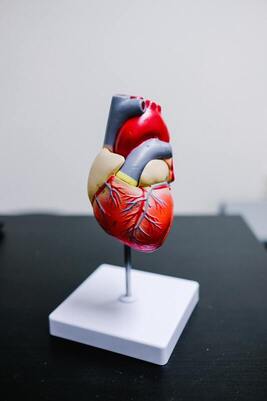 Photo by NeONBRAND on Unsplash Photo by NeONBRAND on Unsplash I’ve grown weary of all the talk about the heart in contemplative prayer. Sounds terrible, doesn’t it?! After all, the heart is the focal point of contemplative prayer! But after a while, my heart started getting angry, feeling the burden of such attention and expectation. Nineteenth century Russian mystic Theophan the Recluse said, “To pray is to descend with the mind into the heart, and there to stand before the face of the Lord, ever-present, all-seeing within you.” Teachers of prayer and contemplation, like Theophan the Recluse, have emphasized the heart and taught various ways of guiding us to pray from it. I have learned and offered others various ways of integrating such prayer, especially through the imagination as we bring our attention to the heart. But I did not realize how much modernity was still operating under the surface. Contemplative prayer was such a welcome relief for me after prayer that emphasized the “head” with its words, whether thought or spoken. With the latter, once one had invited Jesus into or given Jesus their heart, the focus was on knowing the right beliefs and acting accordingly. All that was needed for prayer was found from the neck up (and the rest was not to be trusted!). This disconnect was not unexpected. When modernity ushered in a time of dissecting in order to discover, the heart became associated with a particular organ in a particular location. Where is the heart? It’s in the chest, of course! It’s job is to pump blood (and woe to the person who trusts any feelings associated with it!). The earliest Biblical people did not think of the heart (lev) in this way. The “heart” of a person referred to the “seat of all of life.” When told to “love God with all of your heart,” this included one’s mind, soul, and strength. For the ancient people, the heart was the whole of a person—feelings, thinking, understanding, will, and wisdom. Since the heart was the center of one’s existence (physically, mentally, and emotionally), to love God with one’s heart was to allow God to be at the center of one’s whole self (body, mind, and soul). What is at our center directs our life. Tapping into and resting in that center with God is the playground of contemplative prayer. However, modernity broke up this inherent unity to study and evaluate the diversity of the parts and it elevated the mind above all else. Contemplative prayer with its emphasis on the heart, invited the mind to descend from it's place of self-sufficiency and recover humility. But, if modernity is still the framework, the draw is to elevate one part over the others, this time placing the heart on a pedestal rather than locating it within the whole. During a time of meditation with a Buddhist, I was not guided to focus on my heart, but to discover any place of openness or peace within. Hearing her words offered me an unexpected ah-ha moment! I immediately was transported back to the Hebraic view of the heart. As I listened to the whole of my body and not just one part, I discovered the burden on my heart and tension in my chest began to dissipate. (Last week I mentioned this inner co-dependency with the heart.) I chuckled as I noticed the openness was in my face, particularly my cheeks. Another time the openness was in my gut, still another behind my eyes. All of these places were open to God but I was unable to see them for my inner eyes were focused on one place! So much wisdom just waiting to be discovered. When God infuses all of oneself, all of oneself is a channel to experience God. The heart is found everywhere, not simply in one physical location. Where am I best able to listen to the heart of God today? I notice an openness in my hands. Through my hands, the heart of God has something to say to the heart of me. Through my hands I listen and offer a prayer. 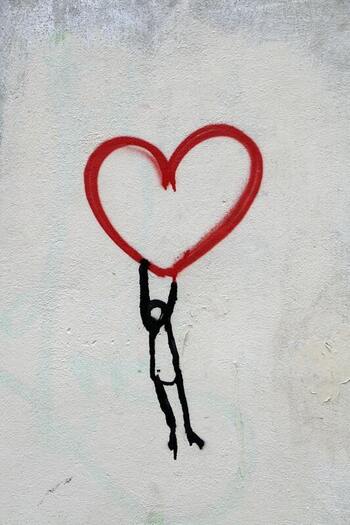 Photo by Nick Fewings on Unsplash Photo by Nick Fewings on Unsplash Living with tension in my chest has been a normal way of life for me for a long while. Feelings of heaviness, anxiety, pressure, and strain are familiar. Usually it is a manageable low-grade variety, but sometimes not. I have dealt with stress in my body for as long as I can remember—from intense stomach issues, headaches, and back pain that began in my early teens through late thirties to chronic hives and tension in my chest that is more prevalent now than the earlier symptoms of the previous decades. What I did not know then that I am beginning to know now is how hard my body has worked in order for me to move through life in productive and even life-giving ways. It has tried to control all the chaos, experienced and perceived, around and within, by holding it in different parts—the head, the stomach, the back, and now the heart. And what does this have to do with Spiritual Direction you might wonder? Well, the spiritual journey is one of giving up control! And that makes a body panic. Authentic spirituality will always lead to surrender and the body is most often the last to let go. Embracing a life of contemplation years ago with its practices of silence, solitude, and stillness has been transformative AND it has led me to this place of being on the brink of a deeper letter go. But first, in teaching me how to be present and not avoid reality, contemplation increased my tension and revealed an inner co-dependency. Weary of the increased tension, I began seeing a somatic therapist (someone who can help me better listen to the wisdom of my body, not just talk about my troubles). She also offers IFS. Internal Family Systems Therapy is a way of working with our internal parts or "family" so that there’s inner harmony rather than polarization and disharmony. I have found it so helpful over the years that I regularly incorporate it into Spiritual Direction with others. So during a session when I turned my attention to my heart, the heart responded with letting me know it was working really hard in “keeping it all together” on behalf of the rest of my body. How?—by consolidating all of the stress and strain into one area, holding it all in the chest…no wonder it felt heavy! As a Reiki Therapist (in addition to being a Spiritual Director), I know that the heart chakra normally filters what is being experienced but my heart was holding it all. Why? It did not want the other parts to feel the pain so it was “taking one for the team.” And the other parts were just fine with this co-dependent relationship. Even if a part was still hurting, it was willingly doing so. This is too common among mothers. Not long ago, I sat across from a mother and wife who has been doing the same thing for her family members. From an outsider’s viewpoint, it can be said that her fun-loving, spirit-lifting self, is the heart of the family. Being sensitive to her family members’ challenges and difficulties, she does her best through a variety of measures to help them not feel pain (or at least not as much), lest in her words, they “be destroyed.” Such a role can drain the light from one’s eyes, while also making it hard to see the co-dependency. Sometimes the only ones who can see clearly are the ones looking from the outside, noticing the absence of the eyes' light. They see the chaos and exhaustion and yet they have the least agency. For no matter how long or often another may see it, true "seeing" must come from within. In the session with my therapist, during a moment of silence, I remembered the painful interaction with my friend a few days before, and my heart said, “What you see in her is me.” Wow! I was surprised and then grateful for this insight. After expressing appreciation for the heroic ways the heart has expressed love for me, the therapist gently reminded this part that it’s easier to pick up a large weight with two hands rather than just one. She went on to say that in allowing other parts to feel the pain and chaos, the burden could be shared. My heart was skeptical but open. It saw and even named the co-dependency itself which meant it was ready for a change. But it still feared that in letting go, I would be destroyed—once again I would experience the searing nerve pain that led to emergency back surgery, the painful IBS that made for uncomfortable moments of dashing toward a restroom, the cancelled plans due to the need to be in a dark room for headache relief, or worse. It wanted to keep me from more of those experiences (and had been doing a pretty good job of doing so!). Yet I had sought help for the tension knowing that true freedom for one does not exist until there is freedom for all, whether in the outer world or inner world. So it began to relax and open in this safe space. And I began to feel the tension spread to my stomach, neck, shoulders, and head…oh no. Gently, I reminded my inner self that I was older now and had insights I did not have earlier in life. We were going to share the burden. And pain did not need to be the enemy. Guess what happened? Instead of being destroyed by the pain, the pain offered wisdom. In being dependent upon the wisdom of the heart, the other parts were sheltered. While this was okay for the short-term, it was unhealthy as a long-term strategy. Yes, different parts of me were not experiencing as much pain, but they were also not aware of the depth of their own strength and agency. “Kasey, when you feel your neck and shoulders get tense, it’s time to take a step back. You’re carrying too much on your shoulders,” the pain in those areas told me. Sometimes we need to step into what we fear may destroy us (or those we love, which is what we fear would destroy us). A spiritual director or therapist is often a wise (and usually a necessary) companion. Sometimes when we take that step, the tension increases. Looking back, the increased tension, even hitting "rock bottom”, is most often what leads to being given new eyes to see. Those new eyes to see help us navigate a new way to be. Next week: “How teaching on contemplative prayer actually encouraged inner co-dependency” As I look forward to speaking at Day 7’s 2021 Self Care Summit on September 14th on "The Wisdom of Colors," I revisited one of the workshops I offered for them in 2020, "Resilience for Spiritual Caregivers." A friend and I were talking about resiliency the other day. Life has presented some big challenges to us recently and we are weary. Some days can feel like a slog and other days a fight "to get back to a sense of normal." Being resilient feels like extra pressure. And if we're honest (& if I'm paying attention to my constantly twitching eye!), we don't know how much more we can take before we crack (thank God I have a good therapist and spiritual director!). So what does it mean to be "resilient"? The Seattle School of Theology & Psychology has been doing research on the topic through their Resilient Leaders Project. Their findings have encouraged people to move away from the idea of resilience as “coping” or “bouncing back.” Coping strategies or self-comfort behaviors may offer some short-term relief but can impact us in negative ways in the long-run. Constantly comforting myself on desserts every night or binging on Netflix for hours a day inevitably will hurt my physical, mental, emotional, spiritual, and relational well-being. They are a temporary solution (and sometimes that's what's needed that moment) that are not a viable long-term one. "Bouncing back" offers an image of returning to who you once were prior to a crisis or before the challenge occurred. But can you really return? Is "getting back to" a redemptive strategy? What if resiliency is growing and becoming stronger in meaningful ways in response to adversity, much like muscle growth? What if the crisis or difficulty you are going through right now has the potential to deepen and grow you in remarkable ways, would you be interested? Watch the video below to discover more. And join me for "The Wisdom of Colors" at this year's Summit as we have fun while gaining insight into the messages colors may be bringing us. Why might the color yellow be showing up when you close your eyes to pray or meditate? What might all the green in your recent dreams offer? The wisdom you are seeking may be in the color you chose to wear today! Tuesday, September 14th, 10:00-11:00am CT Register here.  Photo by Mark Lawson on Unsplash Photo by Mark Lawson on Unsplash There are some poems & places where the images stay with you. When September arrives, Postscript, by Irish poet, Seamus Heaney, is one of those poems for me. Read or listen and watch below. Postscript And some time make the time to drive out west Into County Clare, along the Flaggy Shore, In September or October, when the wind And the light are working off each other So that the ocean on one side is wild With foam and glitter, and inland among stones The surface of a slate-grey lake is lit By the earthed lightning of a flock of swans, Their feathers roughed and ruffling, white on white, Their fully grown headstrong-looking heads Tucked or cresting or busy underwater. Useless to think you'll park and capture it More thoroughly. You are neither here nor there, A hurry through which known and strange things pass As big soft buffetings come at the car sideways And catch the heart off guard and blow it open. __________________________ I remember being at a Nebraska rest stop during a wind storm on my way to Seattle from Cape Girardeau, Missouri, a cross-country move fraught with break-downs, both literal and metaphorical! As I was getting out of the car, the wind caught my driver's side door and blew it wide open. In that moment, all the stress, frustration, and anger that I usually succeed in keeping under wraps stormed to the surface. Much to my surprise, I started raging into the wind as my hair whipped all around! For any witnesses, I am sure it was a sight to behold. I felt both powerful and powerless. It’s a moment I will never forget. And while I have no desire to return to that rest stop in Nebraska, I return to the story quite often! There have been other times my heart has been caught off guard and blown open by unexpected beauty, love, and goodness. Sometimes they have been ordinary moments, sometimes extraordinary—from receiving a tender touch from my spouse after a fight (and it relaxing my defenses) to experiencing an ecstatic vision of being swept up in the Wave of Love (and it changing everything). Whether ordinary or extraordinary, surprises like these are heart-softening and heart-opening. There are places I make a point to return to because they are the places of these heart-softening and heart-opening moments. I had not been expecting anything (or at least I thought I knew what to expect) and suddenly something unforeseen and unplanned happens to “catch the heart off guard and blow it open,” changing that time of year, that place, and me, forever. I cannot help but encourage others to go and see (& experience) these places for themselves—from monasteries to places in nature--especially in September and October. How about you? What are your moments that have caught your heart off guard and blown it open? Where would you suggest someone make time to go to during September or October?  Photo by Jacqueline Martinez on Unsplash Photo by Jacqueline Martinez on Unsplash There are those poems and prayers that one returns to again and again. This is one of those for me. Patient Trust was written by Pierre Teilhard de Chardin, a Jesuit biologist, philosopher, and paleontologist. Paleontology is the study of ancient life and its changes through the fossil record. Fossils take a long time to form. The processes Chardin observed in nature, he also observed in the soul. Let's not forget that we, too, are part of nature! And the Earth has wisdom to share with us who are often hurried and harried. Patient Trust Above all, trust in the slow work of God. We are quite naturally impatient in everything to reach the end without delay. We should like to skip the intermediate stages. We are impatient of being on the way to something unknown, something new. And yet it is the law of all progress that it is made by passing through some stages of instability-- and that it may take a very long time. And so I think it is with you. your ideas mature gradually—let them grow, let them shape themselves without undue haste. Don’t try to force them on, as though you could be today what time (that is to say, grace and circumstances acting on your own good will) will make of you tomorrow. Only God could say what this new spirit gradually forming within you will be. Give our Lord the benefit of believing that his hand is leading you, and accept the anxiety of feeling yourself in suspense and incomplete. -Pierre Teilhard de Chardin, 1881-1955, French Jesuit, paleontologist, biologist, and philosopher. Found in Hearts on Fire: Praying with Jesuits, p. 102-103. ________________________________
Live with this poem-prayer for an extended amount of time. Notice if you are drawn to the same word or phrase or different ones. What is Patient Trust's impact on you? Do you detect any soul shifts (even if subtle)? Some Words for Those Who Won’t Listen (and for Healthcare Workers Who Are Exhausted From Shouting)8/18/2021
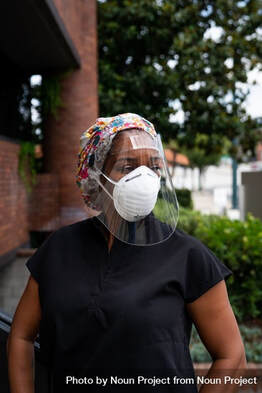 Portrait of thoughtful nurse outside in PPE looking away from camera by Noun Project from NounProject.com Portrait of thoughtful nurse outside in PPE looking away from camera by Noun Project from NounProject.com “Wake up!” they shout. “Pay attention! Turn around!” These are words of prophets. And I have heard from three of them this week alone. With the shouting and weeping of Isaiah and Jeremiah, health care workers are sounding the alarm. Are we listening? They have the “inside scoop” of “reality as it is” rather than what we would like reality to be. COVID is not over. Social issues of the day and people’s selfish lack of response to them fired up Old Testament prophets. But their audience was a “stiff-necked people,” not listening to those who God was speaking through. These nurses and chaplain came to Spiritual Direction fired up about people’s lack of response to this social issue of our day. They are watching a preventable illness kill people of all ages while most seem to go on as though nothing is happening (or simply have decided to due to pandemic fatigue). The fruit of “false prophets” (like a pastor in my town who is preaching against and even punishing parishioners for wearing masks or the government and local leaders playing politics) is fear, division, isolation, hate, and death. They may speak the “right words” even use religious-sounding language, but “you’ll know them by their fruit” taught Jesus. The fruit of these health care prophets is lived-out compassion and the saving of lives. A vaccinated chaplain holds the hands of unvaccinated patients on the COVID floor of the hospital, putting her own and her young family’s health at risk to offer comfort. A nurse recovering from her own break-through case of COVID feels like she’s at the breaking point as she continues to tend to so many patients. A neonatal nurse watches as her pediatric hospital begins to fill and warns that the most vulnerable are suffering due to a view of freedom divorced from the common good. These health care workers are fired up with anger that shouts, “Something must change!” They are fired up…and they are exhausted. “Last year we were everyone’s heroes,” one told me, “this year we are ignored and at times even hated. I don’t understand. We’re seeing so much death and no one is listening to us, no one seems to care about us. Any cards of encouragement sitting around are from last year.” “I don’t know how long I can do this,” another said. It is time to stop dissociating. The path of and toward Life can be hard (& long) sometimes. But as my good friend, Linda says, “We do not do things because they are easy, we do them because they are important.” Listen to what the health care workers are saying is important. Here’s one right here in Tennessee. ____________________________ Now if you are a health care or front-line worker, an adult or child surrounded by people who refuse to heed the prophetic voices of our time, but prefer to “listen to what their itching ears want to hear” (see II Timothy 4:3), I want to offer some observations from a Spiritual Direction session this week. With her permission, allow these insights from a Florida chaplain of a big hospital to speak to you. First, let's begin with some Lectio Divina. Mark 4:35-41 35 On that day, when evening had come, he said to them, “Let us go across to the other side.” 36 And leaving the crowd behind, they took him with them in the boat, just as he was. Other boats were with him. 37 A great windstorm arose, and the waves beat into the boat, so that the boat was already being swamped. 38 But he was in the stern, asleep on the cushion; and they woke him up and said to him, “Teacher, do you not care that we are drowning?” 39 He woke up and rebuked the wind, and said to the sea, “Peace! Be still!” Then the wind ceased, and there was a dead calm. 40 He said to them, “Why are you afraid? Have you still no faith?” 41 And they were filled with great awe and said to one another, “Who then is this, that even the wind and the sea obey him? After listening to the story read to her three times, the chaplain spent time with two phrases she was drawn to: “On that day” in verse 1 and “the cushion” in verse 38. These details held precious wisdom for a way through this pandemic storm. Here is what she discovered:
|
AuthorKasey is a scarf, ball and club juggling spiritual director just outside of Nashville, TN. Play helps her Type-A, Enneagram 1 personality relax, creating space for poetry and other words to emerge. She also likes playing with theological ideas like perichoresis, and all the ways we're invited into this Triune dance. Archives
January 2024
Categories
All
|
By clicking “Sign up for E-News” I consent to the collection and secure storage of this data as described in the Privacy Policy. The information provided on this form will be used to provide me with updates and marketing. I understand that I may modify or delete my data at any time.
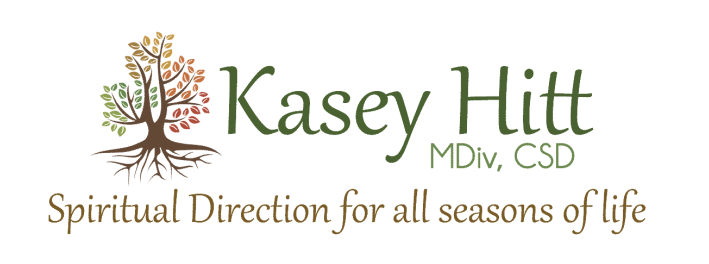
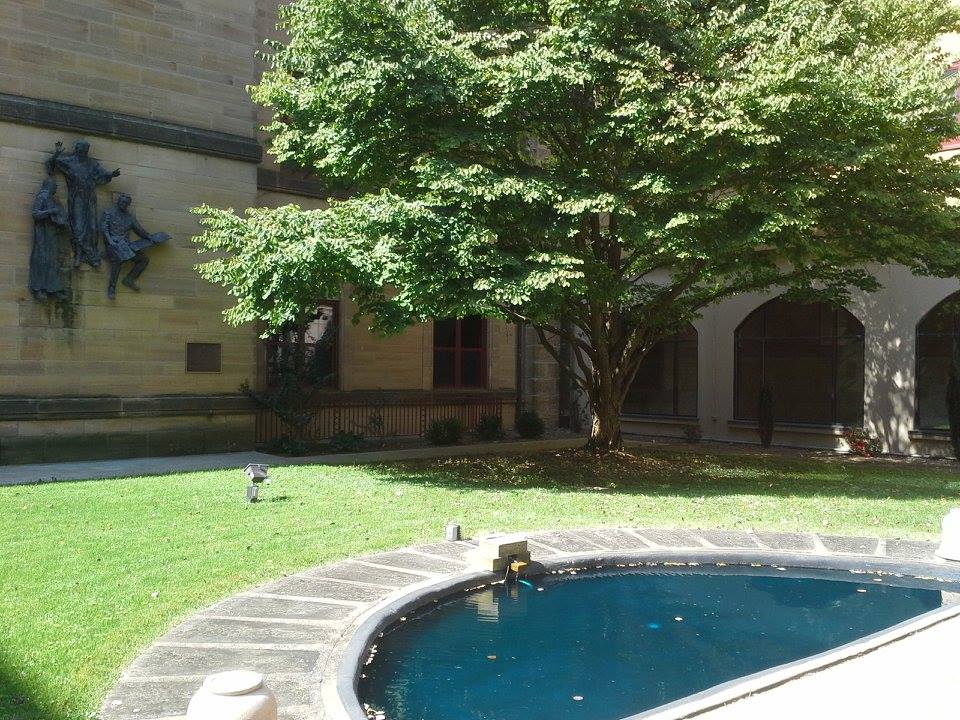
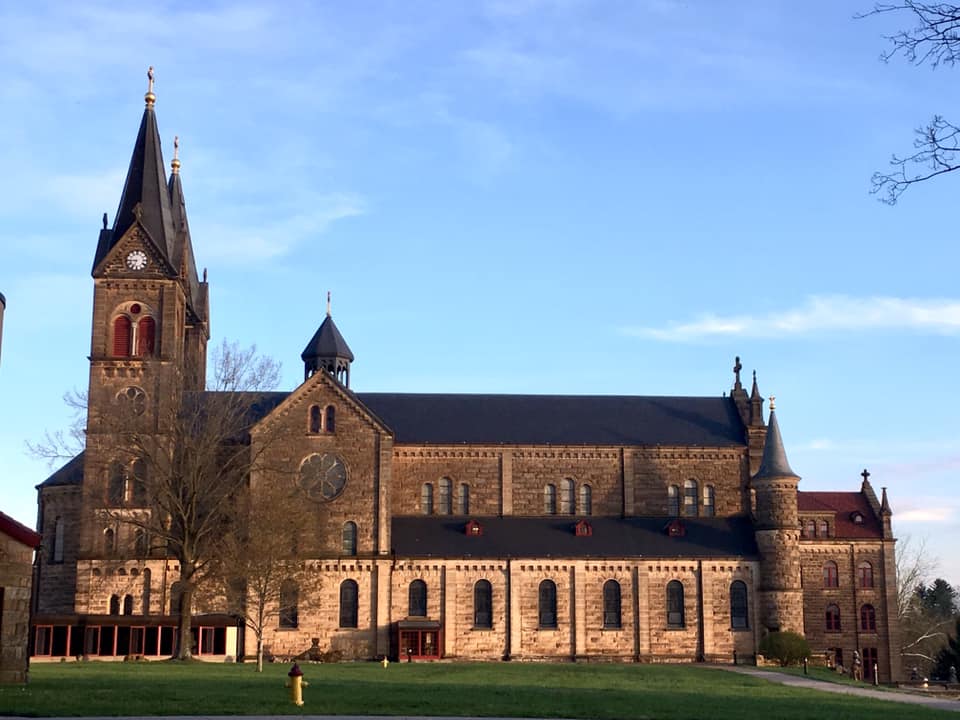

 RSS Feed
RSS Feed

